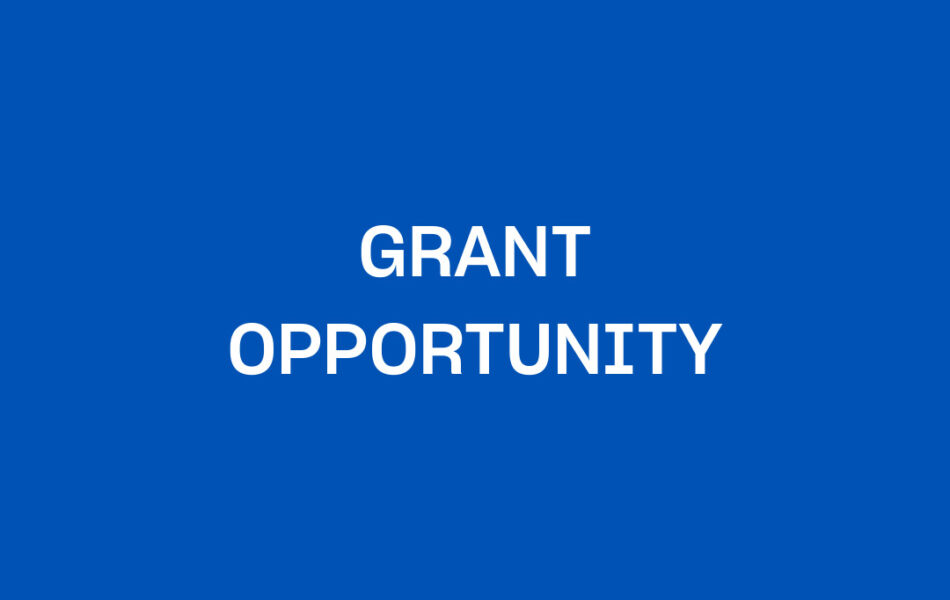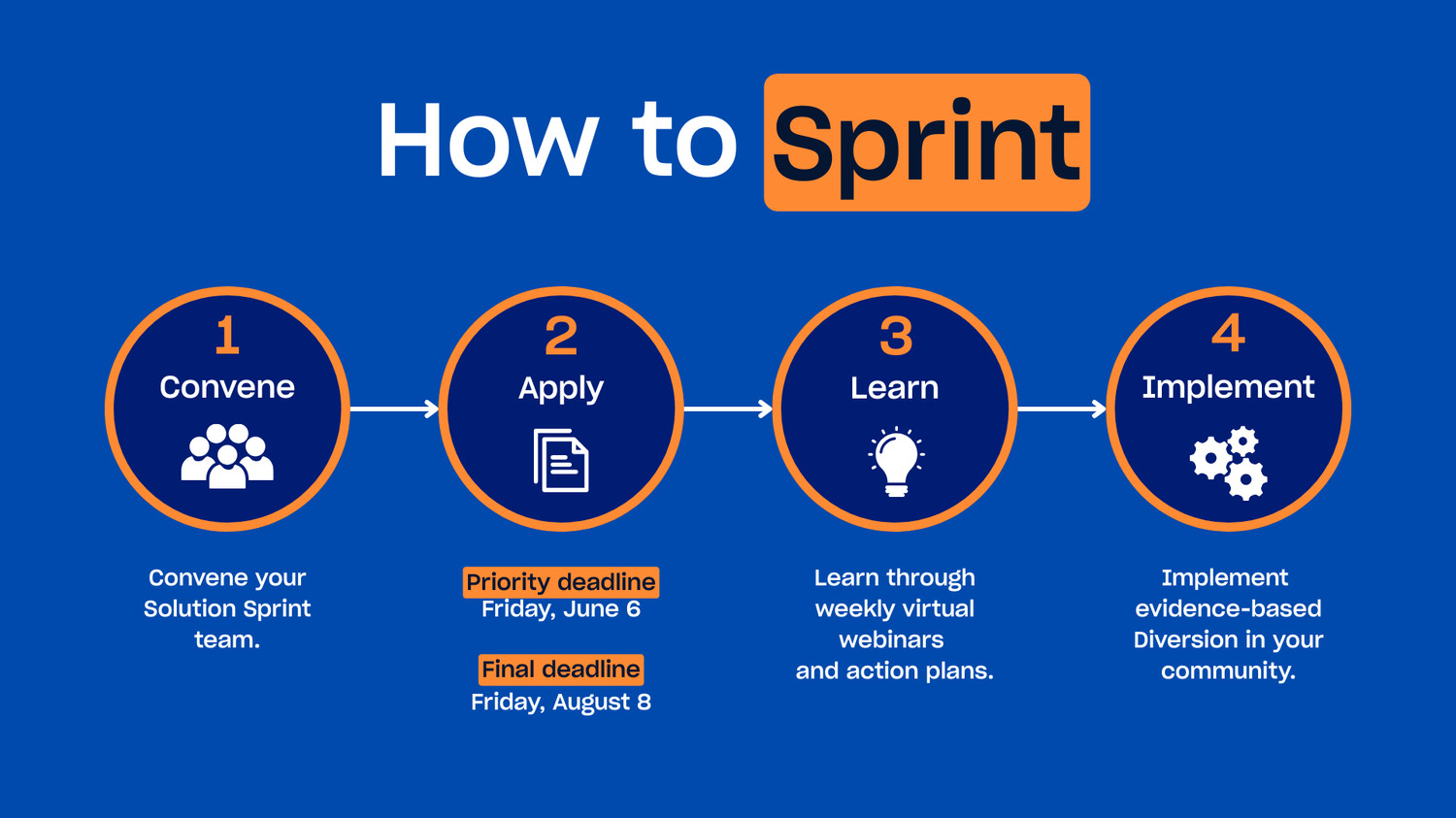Are you looking for innovative solutions to address crime and increase safety in your community?
Do you feel like the tools you have to keep your community safe are not delivering on their promise?
Results for America and the Vera Institute of Justice’s Reshaping Prosecution Initiative invites place-based teams to apply for this 7-session learning opportunity exploring how to design, implement and strengthen evidence-based diversion programs in your community. Teams should include government and community partners and should be committed to advancing diversion in their communities.
If chosen to participate in this Solutions Sprint, teams will learn from a variety of experts and will network with peers from other jurisdictions advancing diversion programs. The Sprint empowers jurisdictions to build a diverse, cross-sector coalition working together to improve public safety outcomes for individuals and their communities.

At least one team will be eligible for grant funding after completing the Sprint.
Key Dates
- Priority Application Deadline: Friday, June 6, 2025
- Final Application Deadline: Friday, August 8, 2025
- Sprint Kickoff: Wednesday, September 10, 2025
- Duration: 7 weekly sessions running from Wednesday, September 10 – October 22, 2025 (each weekly session is 1.5 – 2 hours)
- Where: Virtually via Zoom webinars and cohort discussions

Key Benefits for Participating
Sprint Learning Tracks
This Sprint is designed to support teams in implementing one or more of the following evidence-based diversion strategies: Restorative Justice, Contingency Management or Wraparound Services for High-Utilizers.
Through tailored learning tracks, teams will gain the knowledge and tools needed to design, refine and implement the approach that best fits their community’s needs.
Restorative Justice
A community-driven approach that focuses on repairing harm rather than punishment. Restorative justice brings together those impacted by an offense—including victims, responsible parties and community members—to engage in dialogue, accountability and meaningful resolutions that promote healing and reduce recidivism.
Contingency Management
A behavior-based intervention that reinforces positive choices through structured incentives. Commonly used in substance use treatment and mental health diversion, contingency management rewards participants for meeting milestones—such as attending treatment sessions or passing drug screenings—helping to encourage long-term behavior change.
Wraparound Services for High-Utilizers
Targeted strategies for individuals who frequently cycle through emergency services, jails and hospitals due to unmet behavioral health or social needs. These interventions coordinate care, provide stabilizing resources and connect individuals with wraparound supportive services, reducing system strain and improving long-term outcomes.
By the end of the Sprint, teams will have a clear plan to implement one or more of these evidence-based models in their jurisdiction, tailored to local needs and existing resources.
Sprint Offer
Local jurisdiction teams will join a weekly virtual learning series where participants will have the opportunity to:
1. Learn directly from experts, practitioners and peers working in jurisdictions that have implemented diversion programs.
2. Obtain evidence-based guidance for designing and implementing a customized diversion program in your jurisdiction.
3. Participate in built-in opportunities to strengthen relationships within and across teams and form a coalition of diverse court actors and advocates, recognizing the broad-based partnership needed to effectively implement diversion programs locally.
4. Engage in curated activities to build an action plan that outlines the team’s next steps, including identifying and securing funding, program design in alignment with evidence-based best practices, defining eligibility criteria and referral pathways and developing metrics for evaluation and continuous improvement.
5. Receive technical assistance and become eligible for an RFA grant to support implementation progress post-Sprint.
Sprint Objectives
By the end of the Sprint, participants and teams will have:
1. An expanded understanding of diversion. Teams will learn what diversion programs are, how they relate to the criminal legal process and how they impact public safety. They will also explore three evidence-based diversion models—Restorative Justice, Contingency Management and Wraparound Services for High-Utilizers—and how each approach can be implemented to address public health and safety needs in their jurisdiction.
2. Greater insight into why diversion is a more effective option than arrest and incarceration to keep their communities safe. Teams will explore how diversion programs address the root causes of criminalized behavior, engage communities and contribute to long-term crime reduction. They will also critically examine the costs and consequences of traditional criminal legal approaches and learn how diversion offers a cost-efficient, evidence-based strategy that leads to better outcomes for individuals and communities.
3. Increased confidence and ability to create diversion programs in their communities. Teams will build their confidence and skill in employing data, building stakeholder coalitions, shaping narratives, organizing and advocating for resources to support diversion programming in their communities.
4. Stronger relationships. Teams will strengthen relationships amongst members of their local coalition, identify ways to grow their coalition and develop working relationships with diversion advocates in other cities and states.
Who Should Apply
This Solutions Sprint opportunity is designed for local or state jurisdiction teams interested in implementing or expanding diversion programs in their court systems.
Applicants are encouraged to apply as part of a broader coalition that brings together key stakeholders from the criminal legal system and community organizations. This includes courts and service providers looking to launch a diversion program or expand into new service areas.
To maximize the Sprint’s impact, teams should aim to submit a strong, well-rounded team in the application, though additional team members can be added after applying.
Participating members of the team should include, but are not limited to, the following leaders and staff:
Required
✅Prosecutor or judge
✅Community-based service provider (e.g. organizations providing community mediation, substance use treatment and/or wraparound services)
Strongly Recommended
✅Additional court stakeholders (e.g. public defenders, court administrators, statewide associations and coordinating councils)
✅Government staff (e.g. City Council, Mayor’s Office, Health Department, Housing Department, State representatives)
✅Community-based organizations representing the interests of justice-impacted individuals (e.g. housing justice, social justice, racial justice)
✅Program evaluation partner (e.g. academic or research institutions)
Participation Requirements
To ensure a meaningful and impactful Sprint experience, teams ultimately selected to participate are expected to demonstrate the following in their application:
Interest and Commitment: Participating teams should demonstrate a clear interest and commitment to implementing a diversion program in their community. This can include existing progress or goals such as:
✅Establishing or expanding a diversion-focused coalition that includes community organizations, legal service providers and government officials
✅Conducting research on diversion models, consulting with experts or attending educational events
✅Gathering local data on the use of incarceration and analyzing potential opportunities for diversion
✅Allocating or securing government funding to support diversion programs
✅Launching a pilot diversion program to test effectiveness and measure outcomes
✅Advancing or enacting policies that establish diversion as a formalized practice in the local criminal legal system
✅Sustaining or expanding an existing diversion program to expand reach, eligibility or into new service areas.
Active Participation: A majority of the team (3 – 5 members) are able to fully engage in the Sprint. This includes attending all sessions, engaging in group discussions, and completing assignments.
Long-Term Investment: Committed to achieving the goals of the Sprint, both during and after its completion.
Equity Integration: Committed to advancing equitable justice access and outcomes by addressing racial, economic and health disparities through diversion programs.
Person-Centered Approach: Dedicated to centering directly impacted individuals in the design, implementation and evaluation of diversion programs.
Sprint Facilitator
Weekly sessions will be designed and led by the Reshaping Prosecution initiative at the Vera Institute of Justice (Vera): Founded 1961 in New York City, the Vera Institute of Justice works to secure equal justice, end mass incarceration and strengthen families and communities across the United States. The Reshaping Prosecution initiative operates on the core belief that communities will be safer if fewer people enter the criminal legal system. The initiative works with prosecutors to reduce incarceration, primarily by keeping people out of the system and building evidence for alternative approaches to long-term public safety, most often through partnerships with local community-based organizations building innovative diversion programs.
Why Advance Diversion Programs?
The Challenge
Everyone in every community deserves to feel safe, but “tough on crime” approaches that favor punishment and incarceration have been unsuccessful when it comes to public safety. Traditional reliance on incarceration has not only failed to achieve public safety goals but has, in many cases, contributed to further harm. Research shows that incarceration can increase crime by exacerbating trauma, disrupting lives and limiting access to opportunities. Additionally, systemic racism has led to entire communities being deprived of essential services, creating cycles of justice involvement that undermine public safety. To build safer communities, it is critical to explore and implement solutions that address these underlying issues by prioritizing approaches that promote rehabilitation, equal access to services and long-term well-being.
Megan Nayak from the Vera Institute of Justice explains why is it important to focus on diversion as a crucial aspect of prosecutorial reform.
A Solution: Public Safety Through Diversion
Communities must look beyond traditional, carceral approaches to crime and toward alternatives that achieve true public safety. They must focus on reducing and repairing harms caused by the system in ways that are directly responsive to the demands of the people and communities that have historically been harmed. Policies and practices must be fundamentally changed to address racial disparities and ensure respect for the inherent dignity of all people. Only through this transformational approach can we achieve lasting public safety.
Diversion programs are an opportunity for jurisdictions and communities to begin this daunting work. These programs allow us to hold those who commit crimes accountable while also ensuring that the root causes of their contact with the legal system are addressed. They allow people who are charged with offenses to remain in their communities while they receive services and resources that directly relate to the circumstances that led to their contact with the criminal legal system. Diversion programming also ensures that people who are charged avoid devastating collateral consequences and have the opportunity to grow and thrive in their communities instead of languish behind bars.
“We help somebody find a job so they don’t have to steal. We help them with their mental health and their drug issues so they don’t need to self-medicate and find themselves having lost that job.”
Steve Descano, Fairfax County Commonwealth’s Attorney, speaking of the "Taking Root" diversion program